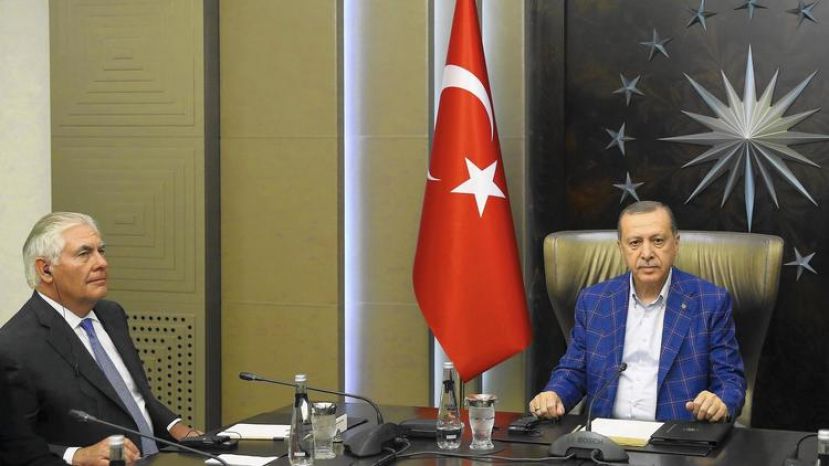Murat Guzel: Tillerson's Visit to Istanbul Strengthens U.S.-Turkey Relations
- Written by Admin TOA
- Published in Politicians
 Presidency Press Service via AP
Turkey’s President Recep Tayyip Erdogan (right) meets July 9 with Secretary of State Rex Tillerson in Istanbul.
Presidency Press Service via AP
Turkey’s President Recep Tayyip Erdogan (right) meets July 9 with Secretary of State Rex Tillerson in Istanbul.
Just over 30 years ago, I emigrated from Turkey to continue my post-graduate degrees at Lehigh University to pursue my American dream. As Secretary Rex Tillerson visited my birth country two weeks ago, I reflect on just how far the U.S.-Turkey relationship has come in the last three decades. The exponential trade growth between our two countries, driven by numerous "commercial diplomats" like myself, deserves greater reflection on the anniversary of the darkest chapter in Turkey's recent history — the failed coup on July 15, 2016.
The most significant thing about President Trump's "America First" mantra is an emphasis on the need for American foreign policy to prioritize and engender economic growth at home.
One country that has had a highly successful mutually beneficial economic partnership with the U.S. is Turkey. And yet the truth remains unchanged: Losing Turkey as an economic partner in today's world would mean a big loss for America and Pennsylvania in particular.
Turkey is America's fourth largest trading partner and one of its most important strategic counterparts in the world. As the Turkish economy has grown, the United States has directly benefited.
As of 2015, according to SelectUSA, over $1.2 billion of Turkish investment has come to small towns and large cities across the United States. Majority Turkish-owned firms employ nearly 5,000 Americans. American companies have been able to export upward of $3.6 billion of products just in 2015 to Turkish consumers, according to the Commerce Department. Over $463 million of Pennsylvania products were exported to Turkey in 2016. This was a 27.9 percent increase from 2015.
The Obama administration raised the U.S.-Turkey relationship from an economic partnership to a fully strategic one in 2009. That led to the creation of the Framework for Strategic Economic & Commercial Cooperation. The move has paid off very well: $17 billion worth of trade was conducted between our two countries in 2015 alone. Turkey is experiencing growth in every major sector, from energy to pharmaceuticals to tech and innovation. This is encouraging hundreds of iconic American brands, such as Ford or GE, to invest in and to export to Turkey.
Still, Turkey's economic impact goes far beyond its strong relationship with the U.S. Its international contributions — be it economic or strategic — stretch from its participation in the World Trade Organization to its membership in the Organization for Security and Cooperation in Europe as well as the European Union's Common Market. Its strategic importance alone is thus vital to, above all, both the U.S. and the EU, two of the Western world's most important entities.
Turkey's own economic progress has also been impressive as growth in its gross domestic product accelerated to 5 percent at the beginning of this year, a staggering rate considering last year's string of horrific terrorist attacks, the failed coup attempt and an influx of 3.2 million refugees. Despite all that instability, Turkey maintains its role as a strategically vital international economic corridor between West and East.
During Tillerson's visit to Turkey, many Turkish families were reflecting on tragedies of the last year. As a proud son of Turkey and even prouder American citizen who has built an international organics food business, I view this first-year anniversary through a hopeful lens. For the Trump administration, re-establishing strong and stable government-to-government relations will only further facilitate numerous private sector success stories. A strong Turkish economy will not only make for a stable region and allow for Turkey to care for refugees but also, as history has shown, directly benefit America.
When returning from trips abroad as my flight taxis to the gate, I often consider the wisdom of our Founding Fathers. Indeed, they are what truly make America great. George Washington wrote in his Farewell Address in 1796 that "our Commercial policy should hold an equal and impartial hand ... establishing [relations] with Powers so disposed; in order to give trade a stable course."
We need a stable course with not only our government relations but also our commercial relations with Turkey. Instability in Turkey leading to an economic dip would have consequences for everyday people, those poor refugees and American companies and their employees.
Tillerson's visit is a chance for our two nations to recommit. He must further cement this strategic relationship through the hopeful lens of mutually beneficial commercial policy.
Murat Guzel is founder and CEO of Natural Food Group, an organic food business based in Whitehall Township.
Source: http://www.mcall.com
Related items
- Rep. Wild Invites Lehigh Valley Business Owner to State of the Union
- Businessman Güzel Wrote for Washington Times: How U.S.-Turkey Relations Grow Stronger
- Turkish Businessman Murat Güzel Awarded Ellis Island Medal of Honor
- A Turkish-American at the Camp of Democratic Party Senators’ Elections Committee
- President Trump, Heed the Plight of the Rohingya
Latest from Admin TOA
- Calculatit.net Is Bringing Pricing Transparency to America’s Construction Industry
- Support Independent, Trustworthy Journalism
- Fat Sal’s Italian Specialties Welcomes Customers in Bayville, NJ with a Renewed Concept
- FFD Wood LLC Delivers Custom Woodwork Solutions from Long Island
- A Tax Expert in the U.S. Tax World: An Interview with Samet Oynamıs








